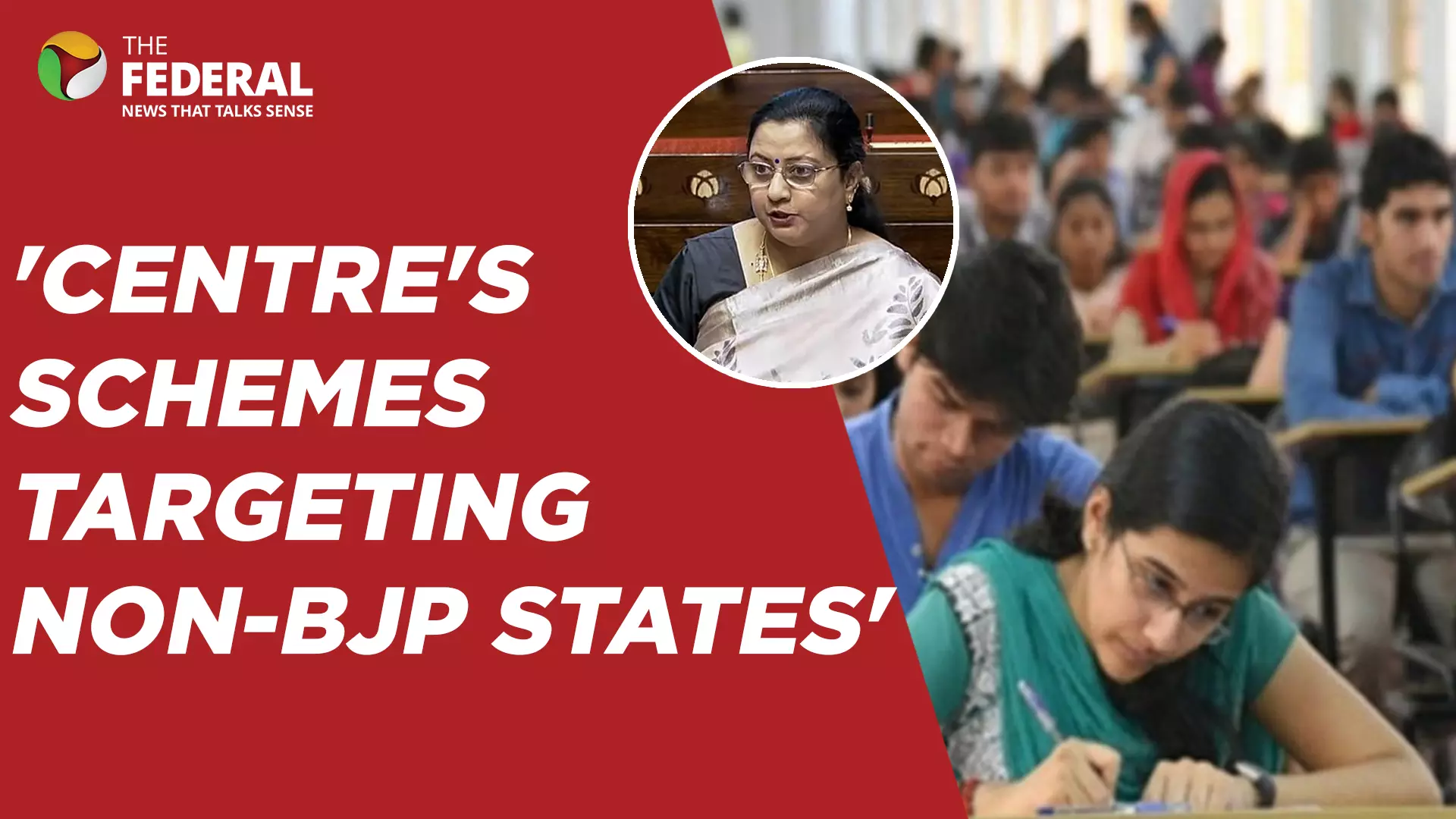
File image of DMJ Rajya Sabha MP Kanimozhi Somu and students in a classroom
Kanimozhi Somu interview: 'UGC gives minimal grant, wants maximum power'
The DMK Rajya Sabha MP emphasised Tamil Nadu’s leadership in education, citing the state’s higher Gross Enrollment Ratio (GER) and its robust primary and higher education systems

DMK MP Kanimozhi NVN Somu strongly criticised the UGC's draft regulations in an exclusive interview with The Federal. Highlighting the DMK’s opposition to the draft, she argued that the new regulations threaten state autonomy and could set Tamil Nadu back.
Also read: TN Assembly passes resolution against UGC's draft regulations
“This is not just a draft,” Kanimozhi asserted, referencing similar Central government policies like the New Education Policy (NEP) and 'One Nation, One Election', which she said have repeatedly undermined state's rights. She accused the Union government of enforcing policies that ignore the unique needs of states like Tamil Nadu, Kerala, and West Bengal.
Tamil Nadu’s educational legacy
Kanimozhi emphasised Tamil Nadu’s leadership in education, citing the state’s higher Gross Enrollment Ratio (GER) and its robust primary and higher education systems. “We have invested step by step and built a palace of education,” she said, arguing that the Centre’s attempts to impose uniform regulations disregard Tamil Nadu’s progress.
Also read: New UGC norms for VC selection draw intense opposition from states
She questioned why states like Tamil Nadu, which have already achieved remarkable milestones, should be subjected to rules designed for less-developed regions. “When it comes to funding, you say we’ve grown. But when it comes to rules, you want to throttle us,” she said, calling it a form of social injustice.
Law and order concerns
When asked about recent law and order issues, including the rape incident at Anna University in Chennai, Kanimozhi defended the DMK government’s response. “Within 24 hours, the accused was arrested, and the inquiry began,” she said, attributing delays in FIR registration to technical glitches caused by Central government systems.
Also read: Fund crunch hits TN universities hard as Centre, state feud over NEP
She also addressed concerns raised by DMK allies, such as CPM and VCK, over restrictions on protests. Kanimozhi dismissed allegations of an “undeclared emergency” in Tamil Nadu, stating that the government has always accommodated Opposition voices and maintained strong alliances.
'Why should we have NEET?'
Kanimozhi pointed to Tamil Nadu’s pioneering initiatives in education and healthcare, emphasising their contribution to social upliftment. “Our institutional delivery rate is higher than the national average because of primary health centres introduced during Dr. MGR’s time,” she said, adding that the DMK government has continued to build on these foundations.
She criticised the Central government for imposing policies like NEET, which she claimed have disproportionately affected Tamil Nadu students. “Why should we have NEET when we’ve produced world-class doctors without it?” she asked while highlighting Tamil Nadu’s educational excellence.
Preparing for 2026 elections
Looking ahead to the 2026 Tamil Nadu Assembly elections, Kanimozhi highlighted the DMK’s focus on pro-incumbency. “What we’ve done for the people will speak for itself,” she said, mentioning flagship schemes like Pudumai Penn for women’s education and the breakfast scheme for schoolchildren.
She acknowledged the role of political strategists in modern elections, noting that social media has transformed the political landscape. However, she insisted that the DMK’s core strength lies in its deep connection with the people.
Kanimozhi concluded by reiterating the DMK’s commitment to state autonomy and federalism. “We are a union of states, not a single entity. Policies should cater to the unique needs of each state,” she said, urging the Central government to respect Tamil Nadu’s progress and independence.
The content above has been generated using a fine-tuned AI model. To ensure accuracy, quality, and editorial integrity, we employ a Human-In-The-Loop (HITL) process. While AI assists in creating the initial draft, our experienced editorial team carefully reviews, edits, and refines the content before publication. At The Federal, we combine the efficiency of AI with the expertise of human editors to deliver reliable and insightful journalism.

